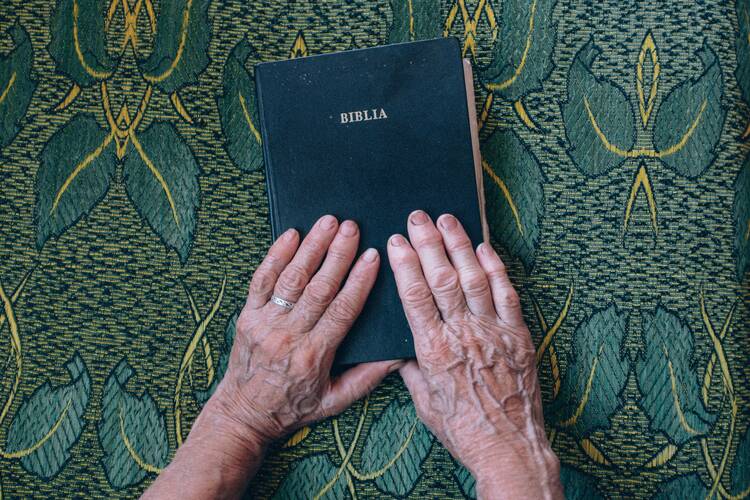The grace of growing old
I
distracted myself with my phone during a long wait for my sister’s
appointment with a pain specialist. An elderly woman maneuvered into the
seat across from me. I shifted in my chair and retracted my
outstretched legs as she reeled in her walker and situated her
belongings. Baggy clothing hung from her tall, thin frame. My gaze
drifted downward to her shoes, the right one untied.
I pointed. “Can I tie that for you?”
Her watery blue eyes locked onto mine. “Oh, yes, thank you.”
I fumbled for words as my casual courtesy suddenly felt intimate. “My own shoes are untied half the time, too,” I said.
It has taken me five years to figure out why the old woman’s gratitude moved me to tears.
As I reached for the armrest to pull myself up, the woman placed her wrinkled hands atop mine. “God bless you! Thank you!” she repeated three times, cocooning my fingers in her warmth. Now my eyes became watery, too.
This took place five years ago. And it has taken me those five years to figure out why the old woman’s gratitude moved me to tears.
I too have begun to struggle with bending over, getting up from the floor and maintaining balance on uneven ground. Undeniable evidence of my own aging. Now in my late 60s, I am the person getting dropped off close to buildings to save walking. I am the one hoping for ramp access instead of stairs. At some point, I may need help tying my shoes.
I should not be surprised at any of my body’s changes—my entire career prepared me for what to expect. For 38 years, I taught nursing students about human development and aging. But for all my attention to achy joints and dwindling reserves, I may have failed to consider the emotional cost of those losses. Most people do not welcome the slowing of movement, restricted range of motion and loss of sensory acuity that often accompany later life. Coping with these changes is a significant challenge.
For all my attention to achy joints and dwindling reserves, I may have failed to consider the emotional cost of those losses.
If I could go back and do it all again, I would shift the emphasis in my teaching a bit, telling my students about the woman at the pain clinic. I would ask them to empathize with the physical limitations and frustration that elicited such effusive gratitude for a simple fastened shoe, or perhaps the loneliness that prompted her to caress my hands.
Science may explain physical aging, but life experience and faith are teaching me far more about how to cope with it. Among the many lessons of my late 60s: Give grace. We who aren’t as fast, agile or sharp as we used to be once fancied ourselves young and quick and indestructible, too. Until we weren’t.
For all I knew, the long arthritic fingers that enveloped mine in that waiting room belonged to a concert pianist. Or perhaps a ballerina who laced up toe shoes for decades before acquiescing to the sensible sneakers I tied. This woman was young and invincible, too, before the chronic pain that now dominated her waking moments.
We live, we age and we will die. How should we accompany one another on our journeys?
The week after my encounter with the elderly woman, I met a new mailroom employee at my office. Watching me struggle to carry several bundles from my car, he opened the door for me. I thanked him and we introduced ourselves. The man’s advanced age and labored gait surprised me, considering his job required so much walking and lifting.
He said he was 73, diabetic and trying to lose weight to reduce knee pain. He lifted his pant leg to show me a new compression sleeve that provided some relief, and suggested it for my own painful knees. I thanked him for his recommendation and offered a casual “God bless you!” as he departed down the hallway.
He stopped in his tracks, stood full upright, and turned to face me. “I receive that!” he proclaimed with a broad smile and a nod, hand over his heart. That was the day I was taught not only how to give grace, but how to receive it.
It is easy to think of older people as always having existed in their current condition. Does it make us feel younger to think that way? More superior? Perhaps we hope it holds our own mortality at bay.
Life does not work that way.
We live, we age and we will die. How should we accompany one another on our journeys?
That day in the pain clinic, I was tempted to simply disappear into my phone, safe and unbothered by anyone else. But I would have missed an important lesson had I stayed there. Apathy and isolation never summon our better angels.
Father Richard Rohr said, “If something comes toward us with grace and can pass through us and toward others with grace, we can trust it as the voice of God.”
It took my own aging to teach me this lesson, to see these encounters as the voice of God, and I still fail more often than I succeed at living it. But I am committed to learning.
Mary Kay Jordan Fleming is professor emerita of developmental psychology and a freelance essayist with publications in Next Avenue; Pulse: Voices from the Heart of Medicine and in several anthologies.






No comments:
Post a Comment